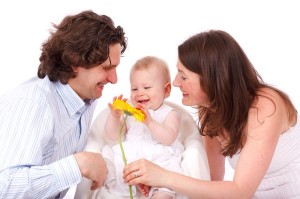I love telling people what I do for a living, as it can start off some really interesting conversations. The initial comments are usually fairly predictable (usually, “I’d better talk properly then” or “do you see people who stammer then?”). However as the conversation progresses, many people are surprised when they find out what I do and the range of difficulties I deal with. It almost always leads on to talking about someone they know who has some kind of communication difficulty as speech and language difficulties are very common – the chances are that most people reading this will know someone who has a difficulty with communication.
One of the things I most frequently get asked about is children around 2 years old who aren’t really talking. As a parent myself, I know that those first couple of years are a wonderful time of watching your child’s development, but it can be worrying when it seems like every other child of the same age can do something that your child can’t (or doesn’t), especially when it’s something as fundamental as communication.
The first thing to say is don’t panic! It’s a cliche that children develop at different rates, but it’s a cliché because it’s true. I’ve seen many, many children around the age of 2 who are not really speaking at all, and at least half of them go on to develop language very well without the need for any therapy. A few months later parents have often commented that now they wish they could stop their child talking!
However, there are of course some children who will need some help, and at that early point it is often very difficult to tell whether your child will be one of them or not. That’s why, if you are concerned about your child’s speech and language, you should refer them to a speech and language therapist. Only your child’s speech and language therapist will be able to give you the best advice to help your particular child and nothing we can say here will ever be a substitute for that. However, if you’re reading this because your child is slow in starting to talk, you want to know what to do now, while you’re waiting for an appointment. So here are my top tips for encouraging your child to use words.
1. Give your child lots of opportunities to talk. It’s easy to get used to the fact that your child isn’t talking and fill in all the gaps in the conversation yourself. Pause lots, and encourage them to communicate in any way they can (eg by pointing, vocalising, gesturing etc).
2. Don’t ask too many questions, it puts your child under pressure and can make them feel more frustrated if they are not able to answer. Instead, comment on what your child is doing when they play, using single words and short phrases ( eg car…. Red car…. Brrm brrm…. Stop). This way your child is hearing words that interest them and is more likely to copy.
3. When you do ask questions, try to give your child a choice, rather than only asking a yes/no question. Eg rather than saying “do you want milk?” say “would you like milk or juice?” Praise any response to begin with – pointing or gesturing is great. When you give your child the thing they have requested, say the name of it again. If they repeat it, that’s great, but don’t worry if they don’t. The aim is to help them remember the word.
4. Use your hands. Use gesture when you are talking. Sing action rhymes with your child. Many people worry that using signs and gestures will stop their child from talking but actually the opposite is true. It helps your child focus on words, enables them to communicate successfully and reduces the pressure on them to talk.
5. Use animal noises, car noises etc with your child. Play any games which encourage them to use their voice and make sounds. Shout and whisper together, make high pitched and low sounds, use electronic toys which make your voices sound funny. Copy back any sounds your child makes and have a conversation without words.







Interesting blog, folks!
I wasn’t sure where to put this, but, if you find it useful you might want to move it.
I sang this all the time to my grandchildren – and they never failed to join in:
(To the tune of ‘Knees up Mother Brown)
“One and nine is ten
Two and eight is ten
Three and seven and four and six and five and five is ten! Hoy!”
The last word is shouted out by everyone – and if you’re in a position to do so you can do a star jump.
Cheers, Paul
Thank you for the feedback. What a great song idea! I haven’t heard that one before. Great for practising number bonds as well!
Elizabeth